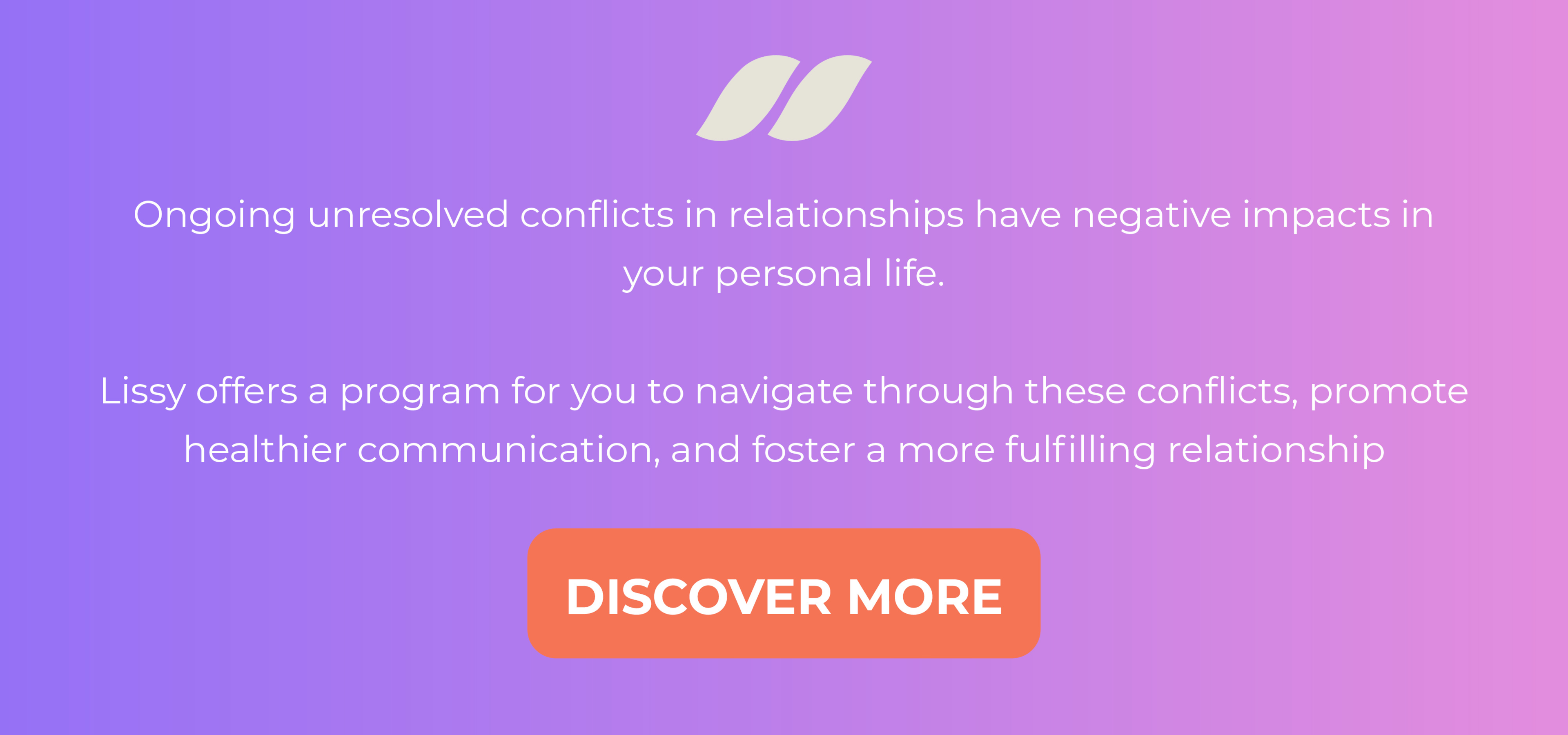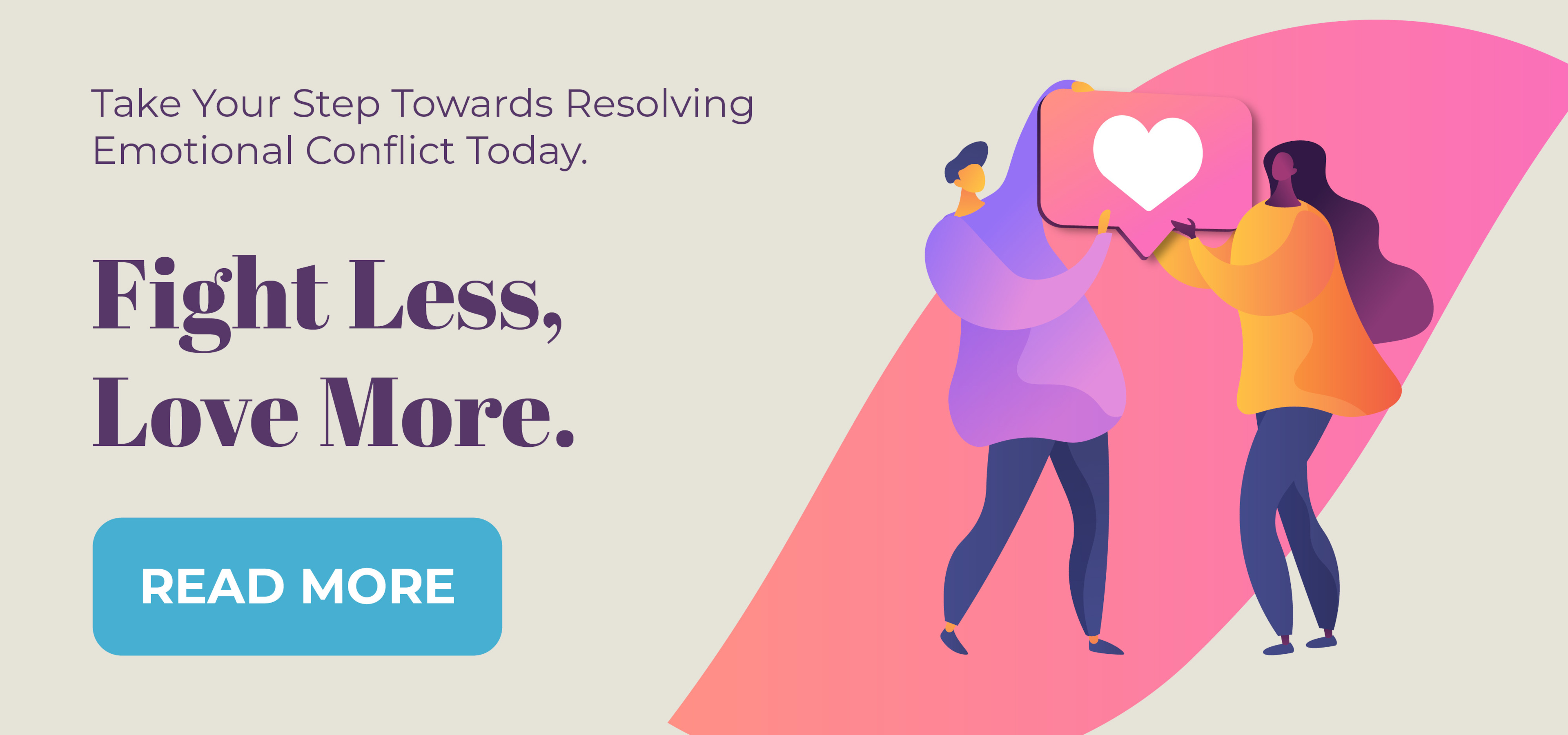The Influence of Emotional Conflict on Relationships

Alex and Jordan often found themselves embroiled in emotional conflict toward each other over their financial affairs. Their conflict never resolved more than for a short while as financial reminders, receipts, bank and credit cards statements, email marketing from stores, and so much more infiltrated their everyday lives. Over and over the couple would find themselves in major arguments over financial matters.
Their initial response to the conflict was typical - a volley of accusations and a rapid escalation of tension. They were both highly reactive, and their heightened emotions caused them to become inflammatory - without any room to connect and seek resolution.
The couple struggled to find a way through the arguments as both of them were locked in their self-righteous positions, feeling wounded by the other, and unable to identify the underlying issues that were fueling their discord.
Ongoing Conflict: the Emotional Price
As the arguments continued, Alex and Jordan began to feel the emotional toll not just individually, but also as a couple. The intensity of their fights left them both feeling drained, often leading to a sense of regret and shame. Despite their best efforts at self-regulation, the emotional response each time was overwhelming.
It became clear that their coping mechanisms were inadequate to mitigate the negative impact of their disputes about their finances. With every argument, they found it increasingly difficult to listen actively and empathetically to each other - further widening the emotional distance between them.
Alex and Jordan were both with inner conflict - neither feeling they were the same person anymore when they were together. Jordan particularly didn't like who he'd become, as he spent more time defending his self-righteous positions than looking for any common ground.
Alex's unconscious mind frequently played out her inner conflict. Over and over she created internal narratives of Jordan being a financial failure and how she felt out of control financially, due to his spending. She was often angry and resentful, and this didn't just impact her home life. She became aware that her cognitive processes were becoming slower, she struggled to focus, and this affected her quality of output at work. She put on her brave face and kept showing up.
Most people had no idea of their stress. In all other circumstances they both appeared fine. They had sufficient emotional intelligence to avoid potential conflict or confrontations. Yet not with each other, with each other they faced repeated conflict situations.
Intense Couple Fights Lead to Partner Alienation

Each argument left them feeling more alienated from each other, as they individually worried about the strength of their couple bonds. Their opposing relating styles, evident in their heated body language and at times harsh words, were clear signs of the deep-seated issues they were facing.
The situation was challenging, indeed. The couple's inability to manage their emotional responses in the face of potential conflict had negative implications for their relationship. Every heated exchange was a missed opportunity to understand the other's perspective and work towards a resolution.
This Couple Were at Breaking Point
It became increasingly clear that unless Alex and Jordan found a way to address not just the surface-level financial disagreements, but also the underlying emotional and psychological dynamics, their connection would continue to deteriorate - even threatening their ongoing commitment to each other.
They needed to learn to navigate their challenging situation, not just for the sake of their financial health, but for the overall well-being of their couple relationship. Then after one fight, Alex declared that she couldn't do this anymore. They needed to resolve their difficulties or they would need to separate.
She was tired of waking up with negative emotions and then needing to head into the workplace. She just could fake another happy emotion anymore. She knew the work culture and society at large expected this from her.
Becoming Aware of the Consequences of their Conflict

It was time for Jordan and Alex to get some help. The two of them had no ability to de escalate their fights, and no strategies to self regulate their nervous systems - this meant they struggled to calm themselves down.
Following Alex's position, Jordan contacted me. He was worried he was going to lose Alex. He finally understood the toll the ongoing and intense conflict was having on their lives.
The Couple Commitment to Develop Together
It was difficult for them to hear each other's opinions and perspectives at first. I expected this, as this is common for couples with intense cycles of conflict. After a few therapy sessions, Alex and Jordan were more able to to listen actively to each other. They had lost this skill in the turmoil of their daily life.
This process wasn't easy, and at times it brought negative emotions to the surface. However, they were committed to their ultimate goal – a healthy and understanding relationship. This commitment remained unwavering - even in moments of doubt and frustration.
One significant breakthrough came when they realized that their conflict resolution skills needed work. In the past, each person had been more focused on winning the argument rather than resolving the issue. Now, they began to see the importance of compromise and mutual understanding.
Each session was a step towards becoming a more empathetic and understanding partner, an essential change for the health of their relationship.
The Safety of a Therapeutic Space

In therapy we started to explore their conflict and to understand it's origins. The point of this was to gain self-knowledge by recognizing the patterns that had led them to this challenging situation. It was a different length and depth of conversation than they had ever had before. Gradually, they began to see the first instance of real progress in their relationship.
The therapy process helped them understand that the conflict was not just about money, but rather a symbol of deeper issues related to trust and security in their life. Through this realization, they started to approach their problem from a new perspective.
As they delved deeper, Alex and Jordan learned to avoid blaming each other and instead focused on understanding the underlying emotions that had been driving their conflict. They were no longer forced into positions in the binary of saving or spending, and were curious about understanding what was behind their respective positions.
For many couples in therapy, they are not just learning to manage their couple disagreements, they learn how to navigate life together as a couple. Each example discussed in therapy provides couples with new tools and insights.
Then partner begin to really see each other - not just as partners in conflict - but as partners in life, each with their own needs and perspectives. This shift in viewpoint is vital in transforming a relationship from a battleground into a supportive, loving one.
What Were Their Fights About If Not About Money?
Their conflict around money was difficult to navigate together emotionally. Their problem wasn't just about their differing views on spending or saving, it represented deeper issues of trust and security.
Their breakthroughs came when they shifted their approach to the conflict. Alex began to actively listen to Jordan, not just to respond, but to truly understand. This change in tactic, from reacting to listening, opened up a new pathway in their communication.
Jordan, feeling heard, moved away from placing blame and started expressing his deeper concerns and feelings. This shift from confrontation to vulnerability allowed them to address deeper issues regarding the finances. They had been completely unaware of how their past experiences and unconscious biases were influencing their reactions.
Inner Conflicts Healed in Therapy

Through self-reflection and open dialogue, they began to uncover these hidden drivers of their conflict. For Jordan these were linked to his childhood experiences of witnessing his parents with little money. As a child he often felt concerned and anxious asking his parents for things he would need, like school shoes or school excursions.
Not only had Jordon felt anxious about money as a child, he had also felt ashamed about his parents lack of funds, and never wanted anyone to know how little they had. As an adult, spending money pushed his inner conflict about money aside. In those moments of spending he felt abundant - that was until Alex found out about his excessive spending and would become upset, and often angry with him.
Alex's childhood experiences around money were vastly different. She saw her parents work hard and then have relative success in their local corner shop. They were careful with their money and saved as much as they could. This allowed them to purchase a family home which became a hub of friends and family connection with many happy celebrations. This is exactly what she wanted to create with Jordan - yet with his spending, her dream always felt more and more elusive.
Prior to therapy she couldn't get through to Jordan and couldn't see a way to make her dreams of owning a home come true. However, their deeper understanding paved the way for a more empathetic and effective resolution.
Now they have the knowledge and skills to navigate difficult conversations. They are immensely proud of their developments, and even have a financial plan that they created and both adhere to - saving for the home they both want.
Couple Commitment Offers a Strengthening of Couple Bonds
For many couples, there is great relief that help is available. Most couples want to remain together. Their commitment to each other and the therapeutic process offers them opportunities for understanding, personal growth and strengthening of their couple relationship.
Join me as we navigate the origins of conflict and uncover strategies to transform it from an exhausting nightmare into a an opportunity for personal development, increasing couple connection and happiness. If this resonates with you, keep reading. I am confident that the insights gained will reshape how you perceive and navigate your conflicts.
Exploring the Origins of Conflict
Can you relate to this situation?
You find yourself in an argument with your partner. Words are exchanged, accusations fly, and tensions escalate - the fight is on. Then when you least expect it, there will be another one in the near future, then another, and they keep happening - and you have no idea how to stop them.
Many of us have experienced being caught up in a web of emotional conflict trying to understand what sparked it in the first place. Arguments can be triggered by many scenarios - from miscommunication, unmet expectations, betrayal, or from personality clashes.
It's not just couples where it emerges. It can emerge within any kind of relationship whether it's between friends, family members, neighbors, colleagues or students. While the triggers may differ, at the core of conflict lies a clash of emotional experiences.
Despite the discomfort that arguments bring about, they are widespread in the lives of humans. They are not mistakes or anomalies in our experience. It's how humans are wired to react when they perceive or experience the other as a threat to one's well-being.
Emotional conflicts do not exist on their own; they are intertwined with factors, such as one's history, their psychological makeup, the nature of the relationship itself, and surrounding circumstances.
When someone has experienced trauma and it remains unresolved and and unhealed then they would be more susceptible to being hypervigilant, defensive, reactive, explosive, less resilient, more easily overwhelmed, and mistrusting, any of these can exacerbate fights.
If someone has grown up with parental fights and acrimony, then fighting at home will not necessarily register as problematic, compared to someone who has not grown up with or experienced such volatility.
As we move forward in exploring the realm of conflict it's crucial to acknowledge that it's not the conflict itself that defines our experience but how we respond to it. Consider this an invitation to engage in a exploration of emotional conflict transforming challenging encounters into opportunities for personal growth and connection.
Unveiling the Dual Nature of Conflict - Adversary or Ally?
Is conflict a sign of deteriorating relationship boundaries? What if it paradoxically functions as the glue that strengthens the bonds between individuals? Many in society tend to perceive conflict as an indicator of disharmony, something to be eliminated at all costs.
However, dismissing conflict as purely destructive fails to recognize its important role. Like a coin with two sides, there's another aspect to the story of conflict. While it's true that friction and disputes can sometimes cause distress and turmoil, they also offer opportunities for connections and personal growth.
In the following sections, we'll explore both sides of this phenomenon, examining conflict's potential to disrupt relationships as well as its ability to act as a catalyst for transformation and strengthening bonds. Our journey begins by shedding light on the overlooked role of conflict as an unexpected hero in disguise.
When approached with awareness and empathy, emotional conflict can actually become a bridge to understanding and intimacy. It gives individuals a chance to uncover and express their feelings, desires, fears, or past wounds that might be contributing to the conflict.
Through these vulnerable exchanges, whether among friends, family members, or partners, not only do they gain a better understanding of each other, but they also form stronger bonds. Emotional conflict also pushes individuals to confront their struggles and leads to significant personal growth. Increased self-awareness often results in improved interactions and ultimately fosters healthier relationships.
It's important not to downplay the pain and turmoil that emotional conflict can bring. However, acknowledging these aspects helps shift our perspective. Instead of viewing it as a monster to banish, emotional conflict can be seen as a challenging yet rewarding mountain worth climbing—an opportunity to explore, grow, and build deeper connections. This happens daily in my consulting room with couples.
At this point, it's essential to pause and reflect on the ground we've covered before delving into the challenges related to conflict and how to navigate its turbulent waters with skill.
We will focus on the experiences of a person in a conflict situation, using an example to illustrate these concepts. The goal is to resolve these issues with a sense of respect and understanding, taking into account each individual's feelings and the role of external factors.
By being aware of these dynamics, we can learn to control our responses and use conflict as a moment of growth and motivation, an essential part of our emotional journey.
Navigating Conflict in Relationships - Real Life Examples
In these real life scenarios we will delve into the ranging impact of conflict in our daily lives and discuss its practical applications and consequences.
Case Study 1: Overcoming Differences
Jane and Steve, a married couple of five years, faced emotional conflicts after Jane's careers advanced. Her promotion brought added responsibilities and with them less time for Steve. Meanwhile, Steve struggled with loneliness and his wife's apparent indifference distressed him greatly.
After a year of resentment, hurt and sadness of unsuccessfully trying to get through to Jane they decided to seek guidance.
Through counseling sessions and therapeutic interventions they learned how to address their conflicts openly and expressively. With time, they managed to strike a balance between their work lives and personal relationship cultivating stronger bonds.
Case Study 2: Parents vs. Teenagers – The Struggle
The Thompson family, including their adolescent daughter Ava, found themselves in a difficult situation with their relationships with her. As Ava went through her physical and mental changes typical of adolescence, she fought tooth and nail with her parents and two siblings. The situation became increasingly intense, straining the harmony within the family.
With the assistance of guidance, the Thompsons discovered ways to recognize Ava's increasing independence, while still ensuring her safety. This process helped bridge the gaps between them, and enabled Ava and her parents to find greater understanding of each other and increased respect for each others emotions. This ultimately transformed their relationship for the better.
Understanding the root cause of the conflict is essential in order to address it effectively.
Step 3: Express Your Emotions
Once you have identified the source of the conflict it's important to express your emotions. This can be done through honest conversations with the person involved or by writing in your personal journal. Sharing your feelings helps release any pent up emotions.
Step 4: Practice Active Listening
When resolving fights, it is crucial to listen empathetically to the feelings and perspectives of the other person involved. Seek to understand their point of view without becoming defensive or engaging in rebuttals.
Step 5: Consider Professional Support
If you find yourself overwhelmed by the conflict, it may be beneficial to seek guidance from a counselor or therapist. They will equip you with effective strategies for mitigating and navigating future conflicts.
Step 6: Embrace Patience
Remember that resolving conflicts takes time. It's a journey. Be patient with yourself and others involved in the process.
Step 7: Encourage Yourself Positively
As you make progress towards resolving conflicts, acknowledge and reward yourself for doing the internal work to allow you the success you have had. Your developments did not appear from thin air.
Check out these steps to help you navigate through conflict, promote healthy communication, and cultivate happier relationships.
The Influence of Conflict on Relationships and Personal Development
Delve Deeper: Resources on Emotional Conflict
If you're interested in exploring the realm of conflict further the resources below offer valuable insights.
Book - Emotional Intelligence by Daniel Goleman. Goleman delves into the concept of emotional intelligence and how an understanding of our emotions can lead to more fulfilling relationships.
Article - Navigating Emotional Conflicts that Impact Your Team (Harvard Business Review). This engaging piece discusses conflicts within teams, and provides strategies for resolution.
Book - Nonviolent Communication: A Language of Life by Marshall Rosenberg. This book presents steps for comprehending and resolving conflicts through interactive communication.
Research Paper - Conflict in Relationships (Journal of Personality and Social Psychology). A comprehensive study on conflict in types of relationships.
Website - The Emotional Conflict section on Psychology Today. This website offers a wealth of articles that explore conflict from perspectives providing a diverse understanding of the topic.
Each of these resources explores the topic of conflict providing knowledge and insight for curious readers. Whether you're looking for strategies, research findings or different perspectives these resources serve as an extension, to our discussion.
Frequently Asked Questions About Emotional Conflict
What are some examples of conflicting emotions?
Conflicting emotions often arise when we experience two or more emotions simultaneously that contradict one another. For instance, you may feel happy about securing a job but also feel sad about leaving your current colleagues.
How is emotional conflict defined?
Emotional conflict revolves around situations, either internal or external, where we have to choose between two or more emotions or scenarios. This can occur in relationships, professional environments, or within ourselves when faced with difficult decisions.
How can we navigate through conflict?
Navigating through conflict requires self awareness, understanding the underlying issues at hand, expressing our feelings genuinely, and actively listening, to the emotions of others.
In cases where finding a resolution seems challenging, seeking assistance such as counseling or psychotherapy can provide strategies to resolve disputes.
What feelings lead to disagreements?
Different emotions can clash and contribute to disagreements, such as anger, jealousy, resentment and fear. When these emotions are not effectively managed or communicated, arguments can arise. However, even positive emotions such as excitement or extreme happiness can cause conflicts if they are not balanced with consideration for others emotions.
Remember it is not the emotions themselves that cause conflicts, it is how we handle them that often leads to disagreements or misunderstandings.
Exploring the Journey of Emotional Conflicts - Summing Up
Throughout our exploration of conflicts we have delved into their complexities and their impact on relationships and personal growth. We have gained insights into the importance of understanding fights and learned practical strategies to navigate them.
Always remember the significance of acknowledging your emotions. It's vital to have empathy and seek understanding with others so you can find a resolution and this will bolster the relationship. If you find yourself overwhelmed with emotional states then seeking assistance is always an option.
By directing our attention towards conflicts, we have uncovered paths to strengthen our relationships and promote growth. But this journey does not end here, it is merely the beginning.
Are you prepared to learn more and invest in your relationships?
Explore the range of online programs designed to enhance your understanding of cycles of conflict. These programs will pave the way for more fulfilling relationships. It's a decision that you will never regret.
Embrace the path towards loving relationships today.
Resolving conflict is both challenging and incredibly rewarding. This knowledge not improves your relationships, it also contributes significantly to personal growth.
If our conversation has resonated with you and you're ready to deep dive into more, Lissy Abrahams is here to provide guidance. With her background in psychotherapy and specializing in couple relationships, she possesses the expertise to equip you with the tools for navigating emotional conflict.
Enroll in her program titled "Fight Less, Love More." This comprehensive program provides strategies that support your journey from understanding to resolution of conflicts.
Why wait? Invest in your well being and relationships today. Transform your life and relationships one step at a time. The journey towards addressing couple conflict begins here.
Begin your journey, towards a life filled with happiness, harmony, and a loving couple connection now.




